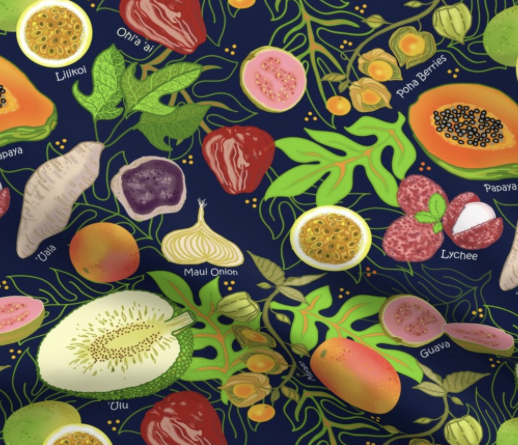The Mea‘ai Trading Platform is a key component of the Trees for People Project. The productivity of the ahupua‘a of pre-western contact Hawaii was based not only on the careful stewardship of productive resources, but also on relationships between members of the community within and between ahupua‘a (ahupua‘a were part of larger land divisions called “moku”). The Urban Agroforestry Ahupua‘a Restoration Project will re-create these relationships in a modern, urban context by developing the Mea‘ai Trading Platform (“Mea‘ai” means “food” in Hawaiian).
Buy and Sell Food from Your Neighbors Using “Foodies”
The Mea‘ai Trading Platform will establish a non-cash digital ledger-based agricultural products trading platform using a complementary currency (“foodies”). Complementary or alternative currencies are usually not legal tender. Instead, their use is based on agreement between the parties exchanging the currency. Foodies will be used both as a convenient medium of exchange and as a way of increasing the volume of transactions amongst members of the community. Increasing the volume of transactions will also increase the connections between members of the community, thus creating a dense network of producer-consumers. Products bought and sold using foodies may include fruits, vegetables, meat and dairy, seafood products, seeds, cuttings, seedlings, or value-added products. By using foodies, users of the platform will be able to easily conduct transactions. Unlike in a barter system, it will not be necessary, for example, to find someone with bananas to trade for your mangoes or tomatoes for your arugula. The Mea‘ai Trading Platform will help to stimulate greater trade and production than would be the case if individuals only produced for themselves.
Reducing Food Waste
An additional benefit of the Mea‘ai Trading Platform is that it can help to reduce food waste (and thus increase community food security). Hawaii residents throw away approximately one quarter of all food and beverage purchases, which equates to a loss of about $700 per person per year. On O’ahu, 15% of residential garbage is food, which is about 425 pounds of food waste per household every year. The total food waste in Hawaii is estimated at over $1 billion per year, which, in 2010, was equivalent to 1.52 times the total production of agriculture in Hawaii.
Among the many obstacles to food production in urban and suburban areas, a major challenge that small-scale growers face is being able to use or consume all of their harvest. They may lack the time, knowledge, or inclination to process their harvest to extend its shelf life (the elderly may also be unwilling or physically unable to climb a ladder to harvest their mangoes, lychee, pomelos, or avocadoes). This situation is particularly acute for those with fruit trees since they may produce bumper crops while in season. With the Mea‘ai Trading Platform, growers will have an incentive to fully glean produce from their trees and trade their excess supply. Nothing need be wasted.
Help us help YOU to grow your “victory garden” and share with your neighbors!
Please help us pay for the implementation of this groundbreaking approach to create a viable local sharing economy. The Mea’ai Trading Platform goes beyond barter to enable people to trade and share not only food, but also knowledge, help, and aloha. Please support this vision by clicking the donate button below. Your gift is tax deductible.

